
Post-Traumatic Stress Disorder (PTSD) is a mental health condition triggered by experiencing or witnessing a traumatic event. Symptoms can include flashbacks, severe anxiety, nightmares, and uncontrollable thoughts about the event. Managing PTSD effectively often requires a combination of approaches tailored to the individual’s needs. Here are five proven strategies for managing PTSD:
- Cognitive Behavioural Therapy (CBT)
CBT is one of the most widely used and effective treatments for PTSD. It helps individuals identify and change negative thought patterns and behaviours related to their trauma. A specific type of CBT called Trauma-Focused CBT is designed to help patients process the trauma and develop coping skills to reduce symptoms. - Eye Movement Desensitisation and Reprocessing (EMDR)
EMDR is a therapy that involves guided eye movements to help individuals process and reduce the distress associated with traumatic memories. It is particularly effective in assisting patients to reframe their trauma and diminish its emotional impact. - Medication
In some cases, medications such as selective serotonin reuptake inhibitors (SSRIs) or serotonin-norepinephrine reuptake inhibitors (SNRIs) can be prescribed to help manage symptoms of PTSD, such as depression and anxiety. Medication is often used in conjunction with therapy for optimal results. - Mindfulness and Relaxation Techniques
Mindfulness practices, such as meditation, deep breathing, and progressive muscle relaxation, can help individuals manage stress and anxiety related to PTSD. These techniques promote grounding in the present moment and reduce the intensity of traumatic memories. - Support Groups and Social Support
Connecting with others who have experienced similar trauma can provide emotional support and reduce feelings of isolation. Support groups offer a safe space to share experiences and learn coping strategies. Additionally, maintaining strong relationships with family and friends is crucial for recovery.
Conclusion
Managing PTSD is a multifaceted process that often requires professional help and personal commitment. Combining therapies like CBT and EMDR with medication, mindfulness practices, and social support can significantly improve the quality of life for those affected by PTSD. If you or someone you know is struggling with PTSD, seeking help from a qualified mental health professional is an essential first step toward healing.



Leave a Reply